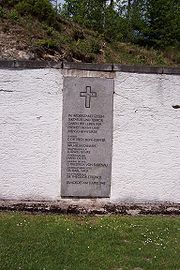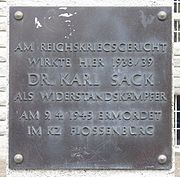
Karl Sack
Encyclopedia
Karl Sack was a German
jurist
and member of the resistance movement during World War II
.
 Karl Sack studied law in Heidelberg where he joined a Burschenschaft
Karl Sack studied law in Heidelberg where he joined a Burschenschaft
(Burschenschaft Vineta) and after a time in legal practice became a judge
in Hesse
. He married Wilhelmine Weber and had two sons. In 1934, Sack joined the newly established Reichskriegsgericht (Reich Military Court) where he quickly rose to a senior position. He was able to delay proceedings against Army Commander-in-Chief Werner von Fritsch
who had been falsely accused of homosexuality
by the Gestapo
in an attempt to discredit him for his opposition to Hitler's attempts to subjugate the German armed forces. In the fall of 1942, Karl Sack became Judge Advocate General of the Army.
 During World War II, Sack maintained contacts within the resistance circles in the military
During World War II, Sack maintained contacts within the resistance circles in the military
, including Admiral Wilhelm Canaris
, Major General Hans Oster
and Hans von Dohnanyi
, as well as with others within the Abwehr
(German military intelligence). He was part of the attempt to assassinate Hitler on July 20, 1944
and after that failed attempt he was arrested on August 9, 1944. In the very last days of the war, he was brought before an SS
drumhead court-martial
presided over by Otto Thorbeck
. He was sentenced to death and hanged
2 days later. Sack had been slated for the role of Justice Minister within a planned post-coup civilian government.
In 1984, Sack's role as a member of the resistance was remembered with a bronze plaque placed in the former Reichskriegsgericht in Berlin-Charlottenburg. There was some opposition to this honour as Sack favoured a far-reaching interpretation of what constituted desertion
, which must have led to more than a few death sentences.
In Bosenheim, a suburb of Bad Kreuznach, a street has been named in his honour.
Germany
Germany , officially the Federal Republic of Germany , is a federal parliamentary republic in Europe. The country consists of 16 states while the capital and largest city is Berlin. Germany covers an area of 357,021 km2 and has a largely temperate seasonal climate...
jurist
Jurist
A jurist or jurisconsult is a professional who studies, develops, applies, or otherwise deals with the law. The term is widely used in American English, but in the United Kingdom and many Commonwealth countries it has only historical and specialist usage...
and member of the resistance movement during World War II
World War II
World War II, or the Second World War , was a global conflict lasting from 1939 to 1945, involving most of the world's nations—including all of the great powers—eventually forming two opposing military alliances: the Allies and the Axis...
.

Burschenschaft
German Burschenschaften are a special type of Studentenverbindungen . Burschenschaften were founded in the 19th century as associations of university students inspired by liberal and nationalistic ideas.-History:-Beginnings 1815–c...
(Burschenschaft Vineta) and after a time in legal practice became a judge
Judge
A judge is a person who presides over court proceedings, either alone or as part of a panel of judges. The powers, functions, method of appointment, discipline, and training of judges vary widely across different jurisdictions. The judge is supposed to conduct the trial impartially and in an open...
in Hesse
Hesse
Hesse or Hessia is both a cultural region of Germany and the name of an individual German state.* The cultural region of Hesse includes both the State of Hesse and the area known as Rhenish Hesse in the neighbouring Rhineland-Palatinate state...
. He married Wilhelmine Weber and had two sons. In 1934, Sack joined the newly established Reichskriegsgericht (Reich Military Court) where he quickly rose to a senior position. He was able to delay proceedings against Army Commander-in-Chief Werner von Fritsch
Werner von Fritsch
Werner Thomas Ludwig Freiherr von Fritsch was a prominent Wehrmacht officer, member of the German High Command, and the second German general to be killed during World War II.-Early life:...
who had been falsely accused of homosexuality
Homosexuality
Homosexuality is romantic or sexual attraction or behavior between members of the same sex or gender. As a sexual orientation, homosexuality refers to "an enduring pattern of or disposition to experience sexual, affectional, or romantic attractions" primarily or exclusively to people of the same...
by the Gestapo
Gestapo
The Gestapo was the official secret police of Nazi Germany. Beginning on 20 April 1934, it was under the administration of the SS leader Heinrich Himmler in his position as Chief of German Police...
in an attempt to discredit him for his opposition to Hitler's attempts to subjugate the German armed forces. In the fall of 1942, Karl Sack became Judge Advocate General of the Army.

Military
A military is an organization authorized by its greater society to use lethal force, usually including use of weapons, in defending its country by combating actual or perceived threats. The military may have additional functions of use to its greater society, such as advancing a political agenda e.g...
, including Admiral Wilhelm Canaris
Wilhelm Canaris
Wilhelm Franz Canaris was a German admiral, head of the Abwehr, the German military intelligence service, from 1935 to 1944 and member of the German Resistance.- Early life and World War I :...
, Major General Hans Oster
Hans Oster
Hans Oster was a German Army general, deputy head of the Abwehr under Wilhelm Canaris, and an opponent of Adolf Hitler and Nazism. He was a leading figure of the German resistance from 1938 to 1943.-Early career:...
and Hans von Dohnanyi
Hans von Dohnanyi
Hans von Dohnanyi was a German jurist, rescuer of Jews, and German resistance fighter against the Nazi régime.-Early life:...
, as well as with others within the Abwehr
Abwehr
The Abwehr was a German military intelligence organisation from 1921 to 1944. The term Abwehr was used as a concession to Allied demands that Germany's post-World War I intelligence activities be for "defensive" purposes only...
(German military intelligence). He was part of the attempt to assassinate Hitler on July 20, 1944
July 20 Plot
On 20 July 1944, an attempt was made to assassinate Adolf Hitler, Führer of the Third Reich, inside his Wolf's Lair field headquarters near Rastenburg, East Prussia. The plot was the culmination of the efforts of several groups in the German Resistance to overthrow the Nazi-led German government...
and after that failed attempt he was arrested on August 9, 1944. In the very last days of the war, he was brought before an SS
Schutzstaffel
The Schutzstaffel |Sig runes]]) was a major paramilitary organization under Adolf Hitler and the Nazi Party. Built upon the Nazi ideology, the SS under Heinrich Himmler's command was responsible for many of the crimes against humanity during World War II...
drumhead court-martial
Drumhead court-martial
A drumhead court-martial is a court-martial held in the field to hear urgent charges of offences committed in action. The term is said to originate from the use of a drumhead as an improvised writing table, altar for religious services, and a traditional gathering point for a regiment for orders...
presided over by Otto Thorbeck
Otto Thorbeck
Dr Otto Thorbeck was a German lawyer and Nazi SS judge.In 1941 Sturmbannführer Thorbeck was appointed the chief judge of the SS and police court in Munich for which SS Standartenführer Walter Huppenkothen was the prosecutor...
. He was sentenced to death and hanged
Hanging
Hanging is the lethal suspension of a person by a ligature. The Oxford English Dictionary states that hanging in this sense is "specifically to put to death by suspension by the neck", though it formerly also referred to crucifixion and death by impalement in which the body would remain...
2 days later. Sack had been slated for the role of Justice Minister within a planned post-coup civilian government.
In 1984, Sack's role as a member of the resistance was remembered with a bronze plaque placed in the former Reichskriegsgericht in Berlin-Charlottenburg. There was some opposition to this honour as Sack favoured a far-reaching interpretation of what constituted desertion
Desertion
In military terminology, desertion is the abandonment of a "duty" or post without permission and is done with the intention of not returning...
, which must have led to more than a few death sentences.
In Bosenheim, a suburb of Bad Kreuznach, a street has been named in his honour.

